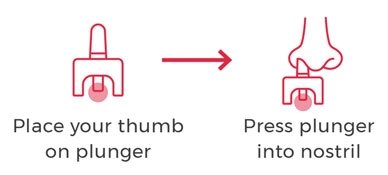Naloxone for Opioid Overdoses
Warning Signs

- Dizziness
- Pupils are very small
- Irregular/slow
- Deep snoring or breathing gurgling noises
If a person is showing these signs, make sure they are breathing and stay with them.
Signs of Overdose

- Not breathing
- Blue or grey lips/skin/nails
- Spasms & rigid muscle
- Seizure-like movements
If they aren't breathing, call 911 and give naloxone.
How do I use naloxone?
Single-Step Nasal Spray

- Place your thumb on plunger
- Press plunger into nostril
What do I do after I use naloxone?
If breathing

- Put person in recovery position
- Hand supports head
- Knee prevents body from rolling onto stomach
- Stay with person until help arrives
If not breathing

- Give rescue breaths
- Tilt head back
- Pinch nostrils closed, give l breath every 5 seconds
- Give rescue breaths until breathing starts or help arrives
Should I give a second dose of naloxone?
- If person doesn't start breathing in 2-3 minutes, give second dose of Naloxone
- If person stops breathing after first dose (during recovery), give second dose of Naloxone immediately
Naloxone can wear off and result in secondary overdose. Stay with individual until EMS arrives!
Content courtesy of the Pennsylvania Department of Health and the Philadelphia Department of Health
Pennsylvania Medical Amnesty Law
Alcohol and other drug poisonings can be fatal. If you see someone who you believe may be in danger due to alcohol consumption or other drug poisoning, call for help immediately. If you reach out for help and follow the four steps below, you will be legally protected by the PA Medical Amnesty Law even if you have also been drinking or using drugs.
Here’s how the law works:
If you, in good faith, 1) call and 2) reasonably believe you are the first to call 911, campus security/public safety, police, or ambulance,
3) give your name and location, and
4) stay with the person to prevent that person’s death or serious injury, both you as the caller and the person needing medical attention are immune from prosecution for consumption or possession of alcohol and/or drugs.
Additionally, under Pennsylvania law, if an individual calls for emergency services on behalf of someone who needs medical assistance as a result of hazing, and that’s how law enforcement finds out about the hazing, both the student who calls for help, as well as the one who needs medical assistance, will be immune from charges for hazing if the four conditions above are met.
Contacts
- Bloomsburg
- Lock Haven
- Mansfield
- Bloomsburg
- Lock Haven
- Mansfield


